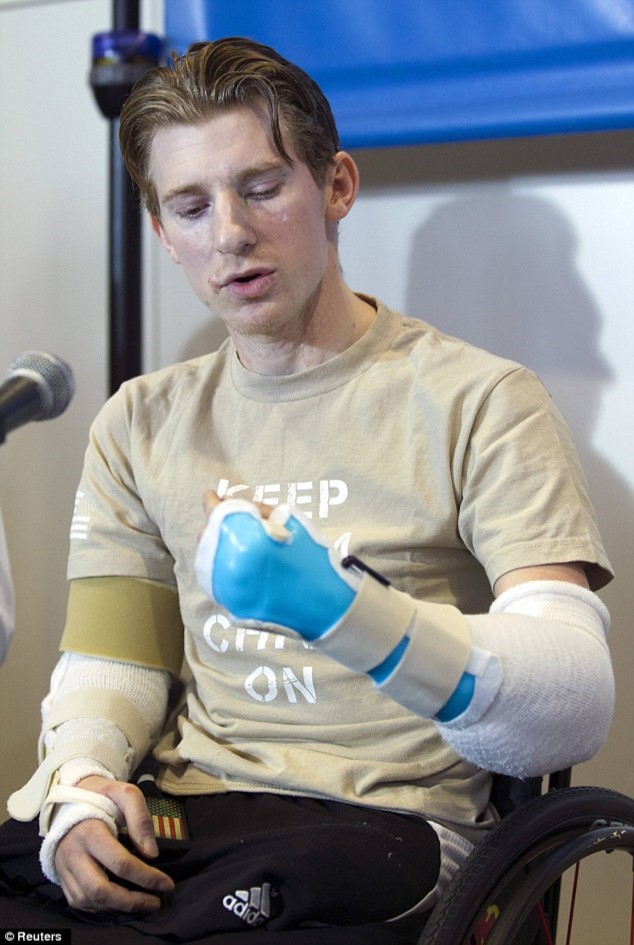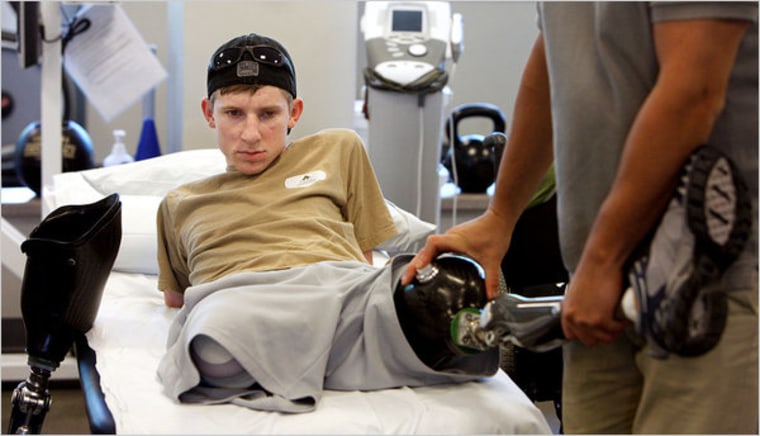Iraq War Veteran Recovers After Losing Arms and Legs
Brendan Marrocco is first to survive such combat injuries in Iraq or Afghanistan.
WASHINGTON | Brendan Marrocco and his brother, Michael, were constructing a summer bucket list, to get them out and about, trying new things. A Washington Nationals game versus their beloved Yankees – sure, since they were stuck here rather than home on Staten Island. Perhaps a ride on the Metro, with its reliable elevators. Pizza: definitely.
How about going to an amusement park? Michael Marrocco suggested optimistically.

“Would that really be safe?” asked Brendan Marrocco, a smirk crossing his lips.
Each would be a major accomplishment for Brendan Marrocco, who a year before had come so close to death that doctors still marvel over how he dodged it. At 22, he was a spry, charming infantryman in the U.S. Army with a slicing wit and a stubborn streak. Then, on Easter Sunday 2009, a roadside bomb exploded under his vehicle, and he became the first veteran of the wars in Iraq and Afghanistan to lose all four limbs in combat and survive.
In the nearly 15 months since, Specialist Brendan Marrocco has pushed past pain and exhaustion to learn to use his four prosthetics, though he can walk for only 15 minutes at a time. He has met sports stars like Jorge Posada and Tiger Woods – and become something of a star himself here at Walter Reed Army Medical Center, where his moxie and humor are an inspiration to hundreds of other wounded service members.
Now he is preparing for a rare and risky double arm transplant at the University of Pittsburgh Medical Center that could profoundly improve his independence.

‘I HIT A PRESSURE WIRE’
Not quite six months into his combat tour, Private First Class Marrocco sat behind the wheel of an armored vehicle as it made its way back to Forward Operating Base Summerall in Baiji, a town in northern Iraq. His was the last truck in a four-vehicle convoy on a routine mission escorting a group of soldiers from one base to another.
All he can recall of that Easter Sunday drive back to his base is the flash of light against the black of the early morning. “I hit a pressure wire,” he said. “It was across the road.”
The bomb, a particularly lethal one known as an explosively formed penetrator, shredded his armored vehicle. His best Army buddy, Spc. Michael J. Anaya, was 𝓀𝒾𝓁𝓁ed. Another soldier was wounded; the fourth man in the truck walked away unharmed.

Maj. Jayson Aydelotte, 38, the trauma surgeon on duty at nearby Camp Speicher, got the call before dawn. Incoming wounded.
Marrocco was rushed in. Within eight minutes, his clothes were off and he was connected to a giant bag of intravenous fluid. Both arms and a leg had been sheared off. The other leg, the left, “was hanging literally by a thread,” Aydelotte recalled.
Doctors quickly began pumping blood into Marrocco’s body, but it sprayed straight onto the ceiling and walls. Aghast, Aydelotte looked more closely. One of the two carotid arteries was severed, an injury so lethal it can 𝓀𝒾𝓁𝓁 within minutes.
The medical team cleaned out each amputation wound, took a vein from his groin to reconstruct the carotid, and sewed him up top to bottom. The same day, he was transferred 85 miles to a larger base in Balad, and then on to Germany.

Marrocco’s father let the phone ring again and again. Nobody important ever called his home number. Plus, it was Easter Sunday. The ringing was so maddeningly persistent, though, he finally picked up.
“Mr. Alex Marrocco?” the official-sounding voice said. Alex Marrocco hung up, assuming it was a telemarketer. Then the ringing started again. A houseguest answered. “It’s a major such-and-such from Hawaii,” she reported.
Not wishing to delay the inevitable, Alex Marrocco demanded, “Tell me what happened and where it happened.” The voice paused, then said, “I’m sorry to have to tell you this, but Brendan was involved in an explosion and he lost both his legs and both his arms.”
Alex Marrocco’s knees buckled. He fell on the kitchen floor.

His ex-wife was in her car that morning after church and checked the voice mail on her cell phone. There was an urgent message from the Army: “Brendan has been involved in an accident.”
The hours that followed were a blur. To stay focused, Michelle Marrocco tucked her despair under her nurse’s cap and digested the facts from the doctors at Landstuhl Regional Medical Center in Germany.
The parents, who separated seven years ago, flew together to Germany, where their son was in a medically induced coma.
By Wednesday night, about 90 hours after the blast, Brendan Marrocco was in Washington in Walter Reed’s intensive care unit.
Alex Marrocco did not have the heart to tell his son about his legs. “During that first week, Brendan kept pleading, ‘Dad, Dad, take my boots off. My feet are burning. My feet are burning.’ I would say, ‘Brendan, your boots are off.” ‘
:max_bytes(150000):strip_icc():focal(329x0:331x2)/brendan-marrocco-1-660-73e516c8c636477794204c67852d919f.jpg)
‘GLAD TO BE ALIVE’
Sitting by her son’s bedside the next week, shortly after he emerged from an operation, Michelle Marrocco noticed that his left residual leg looked particularly bloody. The nurse on duty said a doctor would come by soon to take a look. Michelle Marrocco demanded one immediately. Then her son’s blood pressure began to drop precipitously.
“If I hadn’t been there,” she said, “I feel I would have lost him.”
In those early weeks, the worst of the pain often seized Brendan Marrocco in the middle of the night. On good nights, he slept 20 minutes and then wrestled with pain for three or four hours.
After Marrocco’s brain passed a battery of tests, his family then fretted about his mental health. Could he avoid the powerful punch of depression and post-traumatic stress, a one-two so harrowing it can cripple a soldier as easily as a bullet? Not long after Marrocco regained consciousness, Sgt. Justin Minisall, who had been wounded in the bombing, ducked in for a visit. Marrocco asked how Anaya, the gunner in the truck that day, was doing.
“The sergeant looked at me with wide eyes, and I looked at him,” the private’s father said. “The sergeant told him, ‘He didn’t survive.’ Brendan just laid there and, kind of like everything else, took it in and didn’t really say much.”
A week or two later, Brendan told his father, “I am really sorry that Mike died, but I am glad to be alive.”
As the weeks passed, the Marroccos were forced to look further down the road. The parents each considered quitting work, but each had a mortgage to pay. And the son, while grateful for his divorced parents’ dedication, was afraid they might suffocate him. He was a grown man. He had fought in a war. Then his brother did something nobody expected: he volunteered to leave his friends, his social life and his job in information technology at Citigroup, and move to Washington.
Since May 2009, the brothers have lived on the Walter Reed campus in connecting dormitory-style rooms. The Army does not charge Michael rent and it gives him $64 a day for living expenses. The military also underwrites all of Brendan’s expenses, including the hand transplants, and pays him a $2,400 monthly salary.
The donor has to be a man. The blood and tissue types have to match, of course. But so do the skin tone and size. The call could come at any time, and the Marrocco brothers will high-tail it 237 miles to the University of Pittsburgh to prepare for surgery. They have 10 hours to get there to give the doctors enough time.
Dr. W.P. Andrew Lee, the hospital’s chief of plastic surgery, will lead four teams of more than 20 surgeons to give Marrocco, as he put it, the chance to live “a normal life” (a fifth team will handle the donor). His legs would still be missing. But new, human arms would mean he could put on the prosthetics himself.
He expects to spend six months rehabilitating in Pittsburgh (his brother will move there with him).